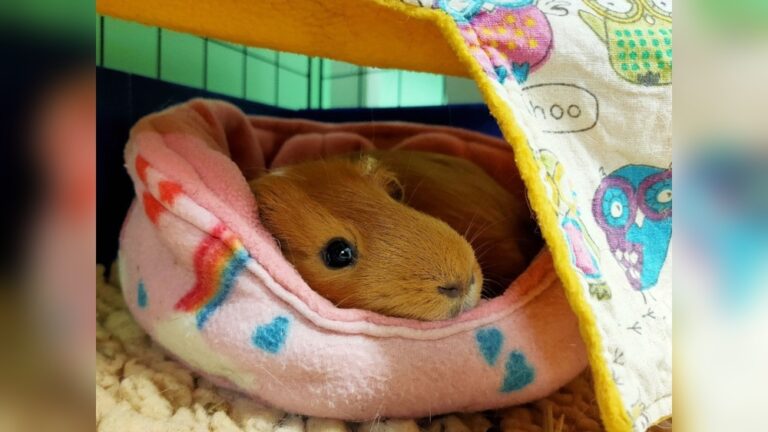Can Guinea Pigs Live Alone: Essential Facts You Must Know
Are you thinking about getting a guinea pig or already have one and wondering, “Can guinea pigs live alone?” You want the best for your furry friend, and understanding their social needs is key. Guinea pigs are known for being social animals, but what does that mean for your pet’s happiness and health?
Keep reading to discover surprising facts about their behavior and find out if your guinea pig is truly okay on its own—or if they need a buddy to thrive. Your pet’s well-being depends on it!

Credit: www.youtube.com
Social Nature Of Guinea Pigs
Guinea pigs are gentle creatures that enjoy company. Their social nature plays a big role in their happiness. Understanding this nature helps in caring for them better. Guinea pigs thrive in groups rather than living alone. They communicate and bond through sounds and body language.
Keeping a guinea pig alone can affect its mood and health. They need interaction to feel safe and loved. Observing their behavior shows how much they value friends. Let’s explore their social behavior and the effects of isolation.
Innate Social Behavior
Guinea pigs naturally live in groups in the wild. They use whistles, purrs, and chirps to talk. These sounds help them share feelings and warnings. They groom each other to build trust and comfort. Group living provides safety and warmth. This natural behavior shows their need for social bonds.
Impact Of Isolation
Isolation can cause stress and loneliness in guinea pigs. They may become quiet and lose appetite. Loneliness can lead to health problems and depression. A single guinea pig may show signs of boredom. Lack of social interaction reduces their lifespan. They need friends to stay active and happy.

Credit: www.guineadad.com
Signs Of Loneliness In Guinea Pigs
Guinea pigs are social animals that thrive with company. Without a friend, they may feel lonely. Recognizing signs of loneliness helps you care better for your pet. These signs often show in behavior and health changes.
Behavioral Changes
A lonely guinea pig may act differently. It might stop making happy noises. It can become quiet or very shy. Sometimes, it may pace or hide more than usual. Lack of play and interest in food are common. Boredom and sadness can cause these behaviors.
Health Issues
Loneliness can affect a guinea pig’s health. They may lose weight from not eating well. Their immune system might weaken, causing illness. Stress from loneliness can lead to fur loss. Watch for changes in sleeping patterns too. Early signs help prevent serious health problems.
Benefits Of Having Companions
Guinea pigs are social animals that enjoy company. Having companions helps them feel safe and happy. They communicate, play, and groom each other. This social interaction is important for their daily life and overall health.
Emotional Well-being
Guinea pigs with friends show less stress and fear. They feel more relaxed and confident. Companions provide comfort during scary or new situations. Loneliness can lead to sadness or anxiety in guinea pigs. Friends help keep their mood stable and positive.
Physical Health
Companions encourage guinea pigs to move and explore more. Active guinea pigs stay fit and healthy. They also eat better with friends around. Grooming each other keeps their fur clean and skin healthy. Guinea pigs without companions may become weak or sick more often.

Credit: www.youtube.com
Introducing New Guinea Pigs
Introducing a new guinea pig to your home needs care and patience. Guinea pigs are social animals and enjoy company. Bringing a new friend can be good for their happiness. But the introduction process must be done right. This helps avoid stress and fights between them.
Take time to create a calm and safe space for meeting. Watch their behavior closely and act gently. This section explains how to introduce new guinea pigs properly and avoid aggression.
Proper Introduction Techniques
Start by keeping both guinea pigs in separate cages near each other. Let them see and smell one another without touching. This helps them get used to the new presence.
After a few days, allow short, supervised meetings in a neutral space. Use a clean playpen or a new area neither has claimed. Keep sessions brief and calm.
Give them fresh food and treats during meetings. This creates positive feelings linked to being together. Repeat these sessions daily until they show calm behavior.
Once they seem comfortable, try putting them in the same cage. Make sure the cage is large enough for both to have space. Watch closely for signs of stress or fights.
Avoiding Aggression
Some hissing or teeth chattering is normal at first. But strong biting or chasing needs attention. Stop the interaction if aggressive behavior grows. Separate them and try shorter meetings later.
Provide plenty of hiding spots in the cage. This helps reduce stress and gives each guinea pig a safe place. Avoid overcrowding the cage to lessen tension.
Keep a calm voice and slow movements around them. Sudden noises or fast actions can scare guinea pigs. Stress can cause aggression, so keep the environment peaceful.
Patience is key. It may take weeks for guinea pigs to accept each other. Watch their body language and adjust your approach. Peaceful introductions lead to happier pets.
When A Guinea Pig Must Live Alone
Guinea pigs are social animals that enjoy company. They usually live happily with friends. Sometimes, a guinea pig must live alone for a while. This can happen for different reasons. Knowing when and how to manage this helps keep your pet safe and calm.
Living alone can be stressful for guinea pigs. Careful attention is needed to make this time as comfortable as possible. Understanding the right steps helps your guinea pig stay healthy and happy.
Health Concerns
Illness can force a guinea pig to live alone. Some diseases spread quickly between pets. Isolation stops infection from passing to others. A sick guinea pig needs quiet and rest. This helps it recover faster. Watch for changes in eating, breathing, or behavior. Call a vet if you see signs of sickness. Proper care during illness is very important.
Temporary Isolation Tips
Keep the isolated space clean and quiet. Give fresh water and food often. Use soft bedding to keep your pet comfortable. Offer toys and chew items to reduce boredom. Spend time near your guinea pig to provide comfort. Gentle talking helps reduce loneliness. Keep the area warm but well ventilated. Avoid loud noises or sudden movements. Check on your pet regularly to ensure well-being.
Enrichment For Solo Guinea Pigs
Solo guinea pigs need plenty of enrichment to stay happy and healthy. Without a companion, they rely on their environment and human care for mental and physical stimulation. Enrichment helps prevent boredom and keeps their minds sharp.
Providing a mix of toys and activities encourages natural behaviors. These enrichments keep your guinea pig busy and reduce stress. Regular interaction with humans also plays a big role in their well-being.
Toys And Activities
Chew toys help keep teeth healthy and strong. Wooden blocks, tunnels, and cardboard boxes offer fun places to explore. Hiding treats inside toys encourages problem-solving and movement.
Rotating toys often keeps things fresh. New shapes and textures invite curiosity. Exercise wheels designed for guinea pigs boost physical activity safely.
Human Interaction
Solo guinea pigs need gentle daily handling. Talking softly and petting builds trust and reduces loneliness. Short playtimes outside the cage provide new sights and smells.
Training simple commands or tricks strengthens your bond. Hand-feeding special treats makes your pet feel loved. Consistent, calm attention is key to a happy solo guinea pig.
How Smart Pets Lover Can Help You with Can Guinea Pigs Live Alone
Learning from Solo Guinea Pigs: Practical Insights for Pet Parents
Understanding whether guinea pigs can live alone opens up practical learning opportunities for any caring pet parent. While guinea pigs are naturally social creatures, there are occasions when a piggy must live alone—perhaps due to health or temperament. Recognizing the signs of loneliness is crucial, as it helps you tailor enrichment activities that keep your solo guinea pig happy and mentally stimulated.
From our experience at Smart Pets Lover, providing a variety of toys, tunnels, and gentle human interaction can bridge the social gap that companions usually fill. This hands-on approach not only supports your pet’s emotional well-being but also deepens your bond, proving that even a lone guinea pig can thrive with the right care.
If you ever feel uncertain about your guinea pig’s social needs or enrichment options, reaching out to reputable pet care resources can be invaluable. Remember, where every wag, purr, and chirp tells a story, your attentive care writes the happiest chapters.
Frequently Asked Questions
Can Guinea Pigs Live Alone Happily?
Guinea pigs are social animals and prefer living with companions. Living alone can cause loneliness and stress. It’s best to keep them in pairs or small groups for mental well-being and happiness.
How Many Guinea Pigs Should You Keep Together?
Experts recommend keeping at least two guinea pigs together. They form strong bonds and feel secure in groups. Solo guinea pigs often become bored and depressed without a friend.
What Are Signs Of Loneliness In Guinea Pigs?
Lonely guinea pigs may become lethargic, lose appetite, or vocalize frequently. They might also hide more and show less playful behavior. Recognizing these signs helps improve their social environment quickly.
Can Guinea Pigs Survive Alone Without Health Issues?
While guinea pigs can survive alone, they are prone to stress-related health problems. Social interaction reduces anxiety and boosts their immune system. Providing a companion is essential for their overall health.
Conclusion
Guinea pigs are social animals that enjoy company. Living alone can make them lonely and sad. Providing a friend helps them stay happy and active. Always watch their behavior to keep them healthy. A pair or small group is best for guinea pigs.
This simple step improves their life and well-being. Remember, a happy guinea pig is a healthy one. Consider their social needs before choosing to keep one alone. Their joy grows with companionship every day.





